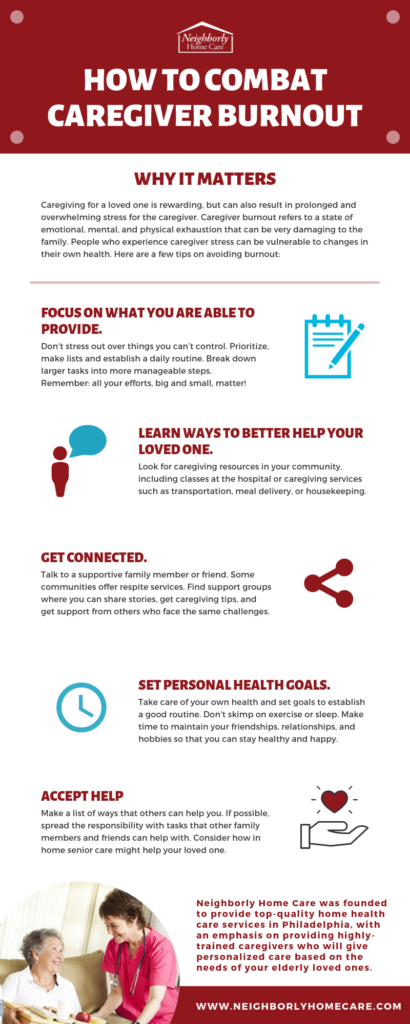What You Should Know About Caregiver Burnout
 On any given day, approximately 43.5 million Americans provide unpaid care to elderly family members or friends. This wonderful, selfless act shows just how much these family caregivers love the older people in their lives.
On any given day, approximately 43.5 million Americans provide unpaid care to elderly family members or friends. This wonderful, selfless act shows just how much these family caregivers love the older people in their lives.
However, providing care, particularly long-term care, can be extremely stressful and emotionally demanding. Worse, this stress can slowly build up until the caregiver is near a “boiling point” and could suffer caregiver burnout.
Anyone who takes on a caregiver role for older adults should maintain awareness of their own mental, emotional, and physical health. When one provides home care for a loved one, a caregiver can feel overwhelmed. If caregivers experience burnout, new problems will arise for them and the person in their care.
Caregivers should know the signs of caregiver stress and burnout and how to address them.
The Importance of Providing Good Care
The importance of providing good care for chronically ill seniors cannot be overstated. Your loved one’s health and well-being depend on it, as does yours. Caregiving can be extremely stressful, especially when caring for a loved one alone. The more support you have from friends, family members, and a professional caregiving agency, the better off you and your loved ones will be in the long run.
The Symptoms of Caregiver Stress and Burnout
True caregiver burnout usually takes a long time to develop. Initially, the problem manifests in much the same way as other forms of stress. These symptoms include:
 Anxiety or irritability
Anxiety or irritability- Depression
- Lack of concentration
- Feelings of resentment
- Increased smoking, drinking, or other drug use
- Insomnia
- Constant feelings of tiredness
- Overreacting to minor problems
- Cutting back, or being uninterested in, leisure activities
These are all warning signs of caregiver stress and burnout. In this situation, the caregiver should seek help for physical and mental health, or support for their caregiving responsibilities. If these signs of caregiver burnout are ignored, and burnout occurs, the caregiver’s health problems become significantly worse:
- Chronic depression, particularly feelings of hopelessness
- Constant illness or other health issues
- Inability to relax, even given the opportunity
- Feelings of anger and resentment towards the one being cared for
- No feeling of satisfaction from caregiving
- Constant feelings of exhaustion which one is unable to alleviate
- Neglecting one’s own bodily needs, such as going without food
Contact Us
Are you a Home Care Worker?
Free Dementia FAQs eBook
The families we serve keep saying great things.
I just wanted to tell you how grateful we are that Neighborly Home Care stepped in & took over taking care of my Dad when we really needed it, no questions asked. Our caregiver has become part of the family and we know we can depend on her being there every day & taking great care of my Dad. He misses her when she’s not there!
— Daughter of an NHC Client

The longer the situation persists, the direr the situation becomes. Caregiver burnout can impact a caregiver’s ability to provide good care to seniors.
Seeking Relief from Caregiver Stress or Burnout
A healthy caregiver is a happy and effective caregiver! Caregivers should always know when to seek help and relief when they notice signs of burnout. Below are a few methods to help avoid caregiver burnout, both in the short-term and long-term.
1. Have people to talk to. Caregivers can find support from their family and friends. A caregiver needs confidants they can relax with to relieve stress.
2. Celebrate the small victories. Caregivers can avoid focusing on the negative by instead celebrating minor victories.
3. Be more accepting. Caregivers can easily fall into a trap of asking “why” they are in the situation or becoming angry at their circumstances. Such anger changes nothing; acceptance is a more positive approach.
4. Seek help. The burdens on a caregiver tend to increase over time, which adds to their stress. Be willing to ask friends or other family members to pitch in!
Why Hiring an Experienced Caregiver is Important
When you hire an experienced caregiver, you can be sure they will have the skills and knowledge to provide quality care. Professional caregivers can also offer more personal attention to a client because a family member has other duties and responsibilities, like their job or spending time with other family members. Often, the best way to prevent burnout is by hiring a professional, experienced caregiver.
Neighborly Home Care Is Here for You
We focus on providing compassionate, personalized in-home care that maintains your loved ones’ lifestyle as much as possible. Our mission is to make your life easier and provide your loved ones with high-quality care services, such as in home, disability, and respite care. If caregiving is becoming a stressful burden, give us a call for a free consultation to determine if full-time or part-time care could benefit you and reduce your risk of caregiver burnout.